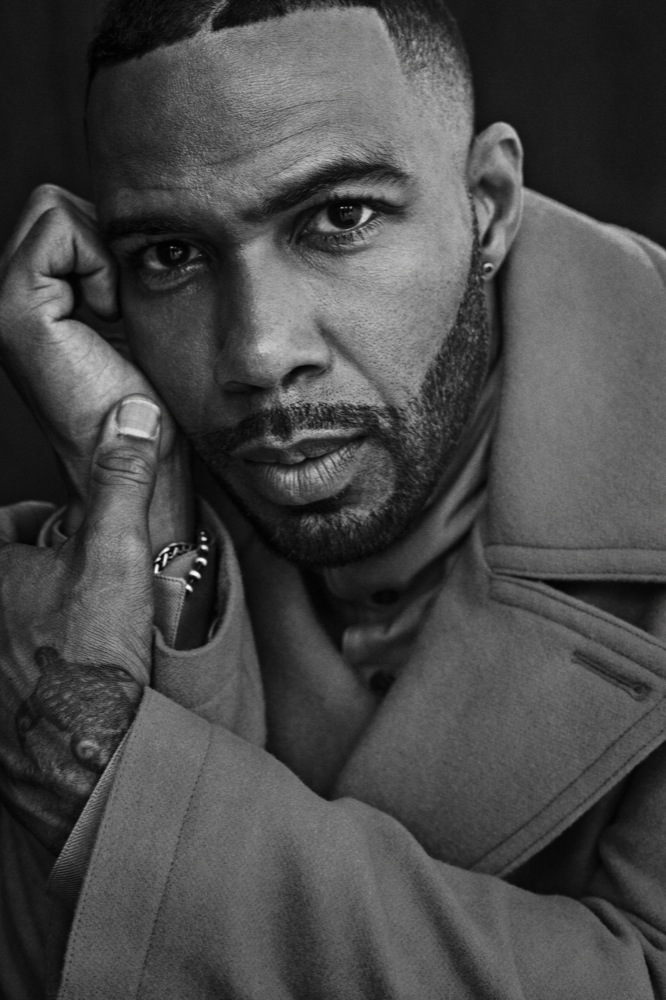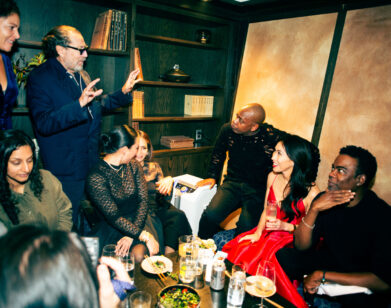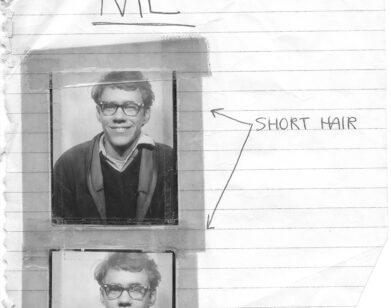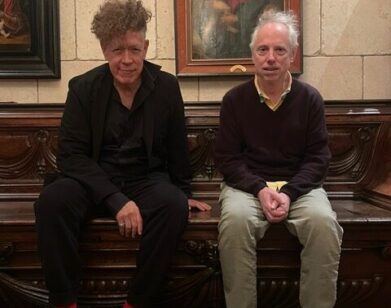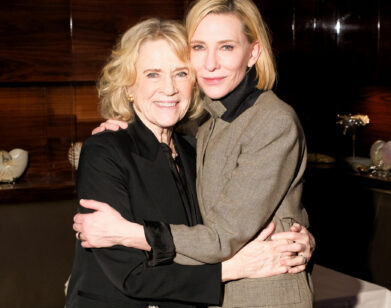Omari Hardwick
PHOTOS: VICTORIA STEVENS. STYLING: SHALA ROTHENBERG/FRIENDS & CREATIVES. GROOMING: NATE ROSENKRANZ/HONEY ARTISTS USING ALTERNA HAIR CARE.
By the time Omari Hardwick landed the starring role of James “Ghost” St. Patrick on the 50 Cent-produced television drama Power, the Georgia-native had already been acting for over a decade. His résumé was diverse: He’d lived in New York, Los Angeles, and Chicago, and been involved in theater productions, poetry slams, indie movies (such as Ava DuVernay‘s I Will Follow and Middle of Nowhere), blockbusters (Kick-Ass), and television dramas (Saved, Dark Blue).
A former college football player, Hardwick continues to cast a wide net. In addition to his role on Power, he is currently working on a spoken word album and has a film production company. In his free time, he mentors athletes, including a few NBA stars.
This weekend, Season Three of Power will premiere on Starz. Here, Hardwick talks to his dear friend and co-star in the forthcoming film Shot Caller, actor Jon Bernthal.
OMARI HARDWICK: Whaddup Bernthy?
JON BERNTHAL: [laughs] What’s up man?
HARDWICK: I’m doing well my brother. I was saying, “I don’t know if Jon’s out of the country. I don’t know where he could be?”
BERNTHAL: I’m with the family and I’m hiding out. How about your boy [Golden State Warrior] Draymond [Green]?
HARDWICK: Not only that, but this year I started mentoring [Cleveland Cavalier] Kyrie [Irving] and it was on another level. It developed into this incredible brotherhood. I actually told Draymond I was mentoring Kyrie and he was like, “That’s good.” I think they’re big time fans of each other as people. Draymond was incredible in that last game, which I was proud of. They both played well.
BERNTHAL: I’m interested in that mentoring as well. I know what your relationship firsthand with Draymond is like. Both of those guys are not just unbelievably talented, but so hard working—they’ve got that fight in them. You have that. Tell me about mentoring, how that came about and what that really consists of.
HARDWICK: I think what happens is [athletes] will watch a show or they’ll watch a movie—I don’t think this is exclusive [to athletes]; entertainers look at other entertainers or other forms of entertainment—for affinity purposes. They’ll go, “I like that actor.” The actor will go, “I like that athlete.” For both Draymond and Kyrie, I think they were like, “I like that guy. Okay, his name is Omari Hardwick.” I think the universe just brings people around others they find to be interesting. I was a fan of Kyrie. I was a big fan of Draymond. I thought Draymond was an overachiever. Kyrie came out more like LeBron. He came out fully counted, decorated, played a year at Duke. Draymond plays all four years [at Michigan State University], [and] that allows him to be so versatile. He can do five different positions on the court. It’s not this extraordinary—or at least, he wasn’t touted as such—gift like what Kyrie has. They both found this thing of, “That actor is somebody that really figured out how to use years of sport and marry that to do something in a whole other industry.”
A lot of them are smart enough to know, “If I can’t find a mentor in my own industry, why the hell can’t I find someone from outside my industry?” I used [Detroit Piston] Joe Dumars as a mentor, along with some older actors from yesteryear: Courtney B. Vance, Denzel, Phylicia Rashad, Glynn Turman, Bill Duke, Richard Roundtree. When I think about the person who’s been most in my ear, it’s Joe Dumars. For [Draymond and Kyrie] to turn around and say an actor was worthy of having their ear, it’s one of the most fun parts of the journey I’m on.
BERNTHAL: You and I talk about this a lot—you just put everything into what you do. Tell us a little bit about your journey through athletics and how that influences your acting. How did you make that shift? You were a serious football player.
HARDWICK: There was a moment when I was sitting in the locker room—I think it was the junior year of playing ball. I knew that could finish in four [years] in the classroom, but I had another year of eligibility because of transferring from Furman University to University of Georgia. The only way I could continue to play ball is if I took up a minor. I always had an interest in telling stories. I thought, “Maybe a football player is telling a similar story just without dialogue.” There’s not a lot of sports that have as many people on the field as football. Does it liken itself to a set environment? Perhaps. I started thinking that way. I thought, “I should fricking minor in theater!”
I sat down as a kid, Jon, and I watched Raging Bull. I thought, “That did something to me I have felt on the football field before.” I saw Cool Hand Luke with Paul Newman, I saw James Earl Jones do The Great White Hope; To Sir, with Love with Sidney Poitier.
When I didn’t necessarily feel like football was going to work out, like getting cut from my attempt in the NFL, I realized I should just go for the gusto because as a football player, it’s immediate. The process is a marathon, but it’s immediate in terms of the hit. You have to make the tackle, bring your hips through, drive to the ground, specifically as a defensive back. There was a moment when I looked at acting that way. I heard everyone say, “It’s a marathon. It’s going to take you forever. You might not shower, you might live in cars.” I went through all that shit, [but] there was a moment where I thought, “I can drive my hips through this shit. I can get in the classes. I can discipline myself.”
I felt like there were so many stories already in a young kid who grew up in an urban environment, but went forty minutes away to an academy where I was one of seven black kids. The visceral, physicality I like to find as an actor definitely comes from all those years of ball for sure.
BERNTHAL: We’ve spoken a lot about your family and your history, the way you came up. You mentioned diving into acting class. As far as your theater education, how do you feel about that? I’m wondering what your opinion is on if someone can learn to be an actor or is somebody born an actor?
HARDWICK: [laughs] Why you asking me that? Why you throwing me under the bus like that? For a long time I wondered if acting coaches were making a whole bunch of scratch on giving false hope to a bunch of kids that weren’t going to make their own scratch at this thing called acting. I was probably wondering it because it was in me enough. You almost have to have that curiosity and that side-eye kind of look, “Is this shit for real?” You almost have to have that in you to be able to act. You have to question! You can’t be bushy-tailed and be like, “They say do A, B, and C. Then all the way to P will happen.”
BERNTHAL: You have to be dangerously curious!
HARDWICK: Yeah, you got to be dangerously curious. I’ve got old enough to not be such an asshole. I’m old enough to say, “You can definitely get better.” Class brings breadth. It brings certain levels of certain tools. You have it or you don’t, [but] you are an idiot if you don’t try to get better and grow. If you don’t have it, then I can’t call you necessarily an idiot. A dreamer’s a dreamer.
BERNTHAL: I remember when you and I came together on set last year, you gave me some really good advice. You sat me down and straightened me out.
HARDWICK: Really? You Jon?
BERNTHAL: [laughs] Yeah, about the TV show! You told me a lot about your relationship with both the character and being this leading man on this unbelievably successful show. I was wondering, now it’s another year, how are you feeling about that? How has Power changed your life? Whatever that means to you, in whatever way.
HARDWICK: My advice to you—now that I remember it—was Jon Bernthal as an actor walks into a room and sees colors other people don’t see. There are a couple actors of our generation who might see things the way Jon does. A couple, it’s not a lot. I was saying, “Stop looking at the colors.” You said, “What do you mean? I got to look at the colors.” I said, “You have to look at the room. You are being offered the room.”
BERNTHAL: Yeah, yeah.
HARDWICK: Ghost in Power, the platform is the room. Job wise, I’m required to fill in the colors. The room, the space, is Ghost. Courtney Kemp Agboh, our show’s creator, and the powers that be at Starz with Chris Albrecht, Mark Canton, and obviously Curtis [Jackson], these guys have allowed me to have the room. At times they might say to me what I said to you: “Stop looking at the colors.”
What feels good to me is what Power has afforded me. I can dig my fingers into some real shit. Is Power real shit? Yeah, but I can’t do that for the rest of my career.
BERNTHAL: That’s that dangerous curiosity we talked about before. It’s never about, “Man I got it all.” It’s always about going for it. I hate throwing the magazine under the bus; this is another one of their questions, but I found it interesting. Tell me about your life in the next five years. Tell me about people you want to work with, the kind of projects you want to be associated with—in any kind of art, because you’re a musician, you’re a poet, you’re an actor.
HARDWICK: I’m presently working on an album with these incredible musicians—Earth, Wind and Fire, Estelle Swaray, Robert Glasper, [who is] our freaking generation’s Herbie Hancock in many ways. Hopefully I get J. Cole or Nas to commit. I want that album, which comes out next year sometime, to be so good that that becomes a template for me to be taken seriously without somebody going, “Oh okay, that was cute. He went and did that.” I want to produce [projects] with you, other actors I adore, directors I want to work with. I want those things to become a lot easier for me—if that means getting to a place where I’m seen in a higher light as a leading man to go into those rooms and be taken seriously as a producer. I think about our contemporary Nate Parker and what he’s done for Birth of a Nation. I’m so proud of what Nate has done for this generation—regardless of color, both genders—in terms of an actor being taken seriously as a producer and a director. In the next five years, I want to see myself at least on the producer side, if not equally on the director side, of on one of these great projects, while doing the music and writing children’s book as well.
I want to get a series, Jon, that goes with [my daughter] Nova growing up—she’s three years old now—and add my son to it eventually as he grows. I definitely want to do a series that follows their maturation and their growth and has all the great entertainers I work with. It would be cool to finish that series by the time Nova’s eight. After that, a 13-year-old ain’t going be reading a book anyway.
[I want to] continue to help with the shorties that are in juvy hall, the shorties that didn’t grow up with pops. I know your story as much as you know mine. There are of contemporaries of ours who champion the same kind of social outreach that we do, and there’s this idea I have to band a lot of us together and do this thing where annually we speak from our perspectives, we give testimony. But we don’t make the fraternity that big. We keep it amongst the collective of folks who believe.
BERNTHAL: I know your family and I know what kind of man you are. I know where you come from. I’ve seen your love for your family. Tell me a little bit about being a father, about being a part of a family, and how that affects you and influences you as an artist.
HARDWICK: It is the most chaotic part of what I do Jon. [My wife] has been very involved in doing the roles she thinks I should do, even most of the ones I say no to.
Where it most matters to me, is being able to be as PTA-father as I can, even if that means just being at home and being able to give [my wife] a moment to be able to find her wings again.
You and I talked about your upbringing with levels of abandonment and feeling that you found brothers in certain people. To make your own family is just the most empowering thing ever. It’s the greatest thing you can ever pull off. I’m an addictive personality—like you know Jon, I’ve got about 22 different tattoos—[but] it’s not to the wrong substances that can take me away from remembering my family. I thank God consistently that my addictive nature is only my mom going, “You got another tattoo.”
SEASON THREE OF POWER BEGINS THIS SUNDAY, JULY 17, 2016, ON STARZ. JON BERNTHAL IS AN ACTOR WHOSE RECENT PROJECTS INCLUDE HBO’S SHOW ME A HERO; ME, EARL, AND THE DYING GIRL; AND SICARIO.

